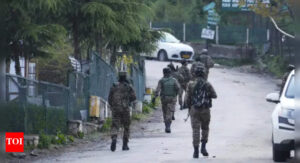
Deciphering the Pahalgam Terror Attack and Its Impact on Indo-Pak Relations
The country was left in shock and grief after a terror attack that claimed 26 lives in the picturesque town of Pahalgam which is known for its unspoiled scenery and calm atmosphere. In addition to upsetting India’s collective conscience this incident has brought the precarious relationship between India and Pakistan into stark relief.
The Event That Rocked the Country

The heavily armed insurgents’ attack on Pahalgam was a carefully planned assault that targeted both security personnel and civilians. Families are in mourning and the country is questioning the security measures in place due to the act’s extreme brutality. Outrage and calls for swift action against terrorism are coming from across the border as a result of preliminary intelligence reports that suggest cross-border connections, even though investigations are still ongoing.
The attack has permanently altered the lives of the people who live in Pahalgam. What once served as a sanctuary for tranquility and the beauty of nature now bears the burden of trauma and loss. Community members have united in solidarity amid the aftermath, demonstrating that resilience endures despite unspeakable suffering.
India’s Reaction: Actions and Diplomacy

The Indian government has taken a strong stand in the wake of the attack, taking steps to demonstrate its dedication to protecting national security and to send a clear message to Pakistan. These activities include:
- A major diplomatic step to draw attention to India’s discontent is the suspension of the Indus Waters Treaty, an agreement that is essential to the two countries’ sharing of water.
- Expelling Pakistani Diplomats: India wants to make it clear that it takes cross-border terrorism seriously by expelling Pakistani diplomats.
- Border Sealing: To highlight India’s emphasis on protecting its borders, the Attari border has been closed to cross-border travel.
To guarantee political unity in addressing the crisis, an all-party meeting has been called. Security and counter-terrorism have become the main topics of conversation as leaders from all political parties have come together to address the tragedy’s immediate and long-term effects.
Pakistan’s Response: Rhetoric and Retaliation

The government of Pakistan, on the other side of the border, has retaliated with threats. Media outlets have been inundated with statements denouncing India’s actions, and high-level security meetings have been called. However, there is currently little opportunity for reconciliation because the ongoing accusations of cross-border terrorism remain a divisive topic.
Concerns have been expressed globally about the two countries’ increasing military and diplomatic posture. Although the likelihood of such engagement seems remote in the immediate aftermath of the attack, international leaders and organizations have called for moderation and communication.
The Human Price of War

The Pahalgam attack’s human cost cannot be ignored, even though diplomatic and political actions frequently make the news. Families struggle to find comfort in the midst of the chaos as they grieve the loss of loved ones. The suffering is not just felt by the victims; as tensions with Pakistan rise, communities all over India worry about what lies ahead.
As the standoff continues, common people in Pakistan on the other side of the border deal with their own uncertainties. Both countries have a history entwined with strife and grief, but their citizens long for peace—a peace that seems more and more elusive.
Pakistan Invokes Clause
The Way Ahead: Obstacles and Aspirations

The terror attack in Pahalgam is a sobering reminder of the consequences of conflict and the region’s ongoing vulnerabilities. Addressing the underlying causes of terrorism and creating a dialogue-friendly atmosphere must become the main priorities as India and Pakistan deal with the consequences. Because of the deep-rooted mistrust and the difficult-to-heal scars from decades of hostility, this will not be simple.
India’s top priorities continue to be bolstering counterterrorism efforts and protecting its citizens. In order to rebuild credibility and ease tensions, Pakistan must address the international concerns about terrorism within its borders.
The international community must also encourage both countries to seek peaceful resolutions and offer assistance when needed. Although conflict may garner media attention, the real triumph—one that benefits both countries and their citizens—is peace.
Conclusion: An Appeal for Solidarity and Fortitude

It is crucial to keep in mind the strength of solidarity and fortitude as the country grieves the victims of the Pahalgam attack. These kinds of situations put a country to the test, and India’s response needs to demonstrate both strength and wisdom.
The hope for a better future must endure for the people of Pahalgam for the families who have suffered greatly and for the innumerable people who long for peace in both countries. The region can only overcome the shadows of violence and leave a legacy of harmony by working together, having meaningful conversations, and remaining steadfast.
DPVNATION





